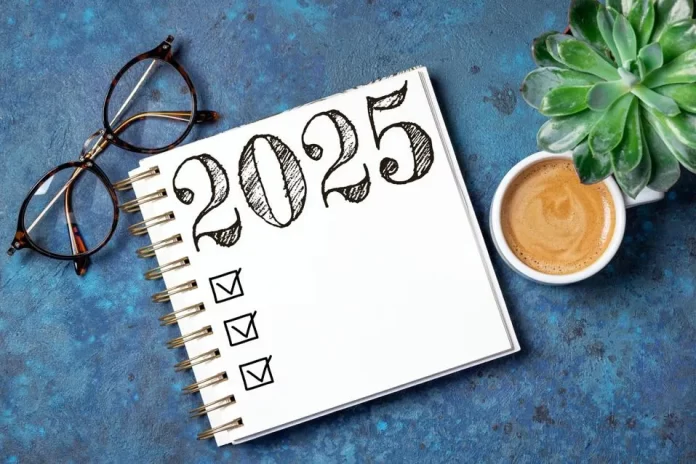Many Nigerians were stunned on Tuesday when the latest Crime Experience and Security Perception Survey report by the National Bureau of Statistics became public.
The end of year 2024 and the arrival of year 2025 bring a moment to reflect, appreciate the past year, and embrace the potential for fresh starts and new opportunities.
The arrival of 2025 is a time to set goals, strengthen bonds, and celebrate the joys of family, friendship, and love. Looking ahead, heartfelt New Year wishes, inspiring quotes, and resolutions all help foster positivity and motivation for the year ahead.
Whether for an individual or a nation, the beginning of a new year is all about reflecting on the past and looking ahead to the future.
As Nigerians join the rest of the world to celebrate the beginning of 2025, there must be a new resolution to do better. While leadership by example seems alien to many public officials in Nigeria, that is what a time like these demands.
The economic downturn offers a great opportunity to prune the cost of running government at all levels. That must be the national resolution if the country is to grow and thrive. When public officials sacrifice for something bigger than themselves, it reawakens people’s faith in government and strengthens community bonds.
For most Nigerians, year 2024 was obviously a chequered year characterised by the good and the not-so-good; a year of mixed progress and problems.
The year began with Nigerians full of hope that the President Bola Tinubu’s administration inaugurated in May 2023 would live up to the promises as encapsulated in its Renewed Hope agenda.
The belief was that its coming would banish the unmitigated suffering and nightmares experienced during the eight years of the Muhammadu Buhari administration.
“As a new journey begins in 2025, we urge the government to take stock of all the negatives and mistakes of the past year and immediately fashion out policies and programmes to drive a recovery process for the country.”
Unfortunately, the expectations of a better life under the new administration were short-lived, no thanks to President Tinubu’s peremptory removal of petrol subsidy soon after he was sworn into office. That decision triggered an economic crisis that has stripped Nigerians of their purchasing power.
As if that was not bad enough, the administration had followed up with the floating of the Naira, an action that made the local currency vulnerable as it has been on a free fall in value since then.
With an economy almost entirely dependent on importation, it was not long before cost of production shot through the roof as local industries battled with the challenge of procuring scarce foreign exchange for their operations. As expected, the long-suffering Nigerian consumers have continued to bear the brunt of these developments on account of sky-rocketing prices of goods and services.
For a fact, the combined consequences of fuel subsidy removal, naira flotation and electricity tariff hike left the economy almost prostrate and in the process took a high toll on most Nigerians, with poverty ravaging the land.
To make matters worse, in spite of the best efforts of government and the armed forces, insecurity continued to ravage parts of the country, especially the North where bandits forced farmers off their farms, making it impossible for them to produce food for the populace, thus worsening hunger in the country.
With no respite in sight, some angry Nigerians took to the streets in August 2024 to protest the ravaging hunger in the land.
But 2024 was not without some positive developments in Nigeria.
Particularly remarkable is the coming on stream of the Dangote Refinery, a private concern; followed by the revival of the Port Harcourt and Warri refineries. Their combined operations are believed to have created some measure of competition that will soon drive down the pump prices of refined petroleum products.
However, one of the key assumptions underpinning President Tinubu’s 2025 budget is an inflation rate of 15 per cent. While many agree that inflation will decline in 2025, the projection appears overly optimistic.
As of November 2024, inflation surged to a 28-year high of 34.6 per cent, compared to 28.2 per cent in November 2023. This spike has been driven by various factors, including higher food and transportation costs, increased housing and utilities expenses, infrastructure deficits, insecurity, low agricultural output, rising energy prices, and higher input costs for manufacturers.
The 70 per cent devaluation of the naira since May 2023, in a heavily import-dependent economy, has tripled the prices of imported goods. Food inflation reached 39.9 per cent in November.
Before Tinubu’s reforms, inflation was already elevated at 22.7 per cent in May 2023, fuelled by monetary and fiscal distortions, structural economic challenges, exchange rate volatility, rising food prices, and low FDI inflows.
Projections by key institutions suggest a less optimistic outlook. The World Bank predicts Nigeria’s inflation will fall to 14.3 per cent by 2027, not 2025, provided ongoing macroeconomic reforms remain on track.
The African Development Bank projects a 20.7 percent inflation rate, while Fitch Ratings forecasts 26.2 per cent by the first quarter of 2025.
Achieving the ambitious 15 per cent inflation target for 2025 will require overcoming significant hurdles.
Nigeria’s economy remains unduly reliant on crude oil exports, which account for over 90 per cent of its foreign exchange earnings.
While crude oil production has improved to 1.8 million barrels per day as of November due to reduced oil theft, oil prices remain volatile.
So, as a new journey begins in 2025, we urge the government to take stock of all the negatives and mistakes of the past year and immediately fashion out policies and programmes to drive a recovery process for the country. Government should introduce programmes to help the people deal with the lingering effects of fuel subsidy removal and naira flotation. It should also intensify efforts to contain insecurity in affected parts of the country.
We wish our numerous esteemed readers a Happy New Year.

